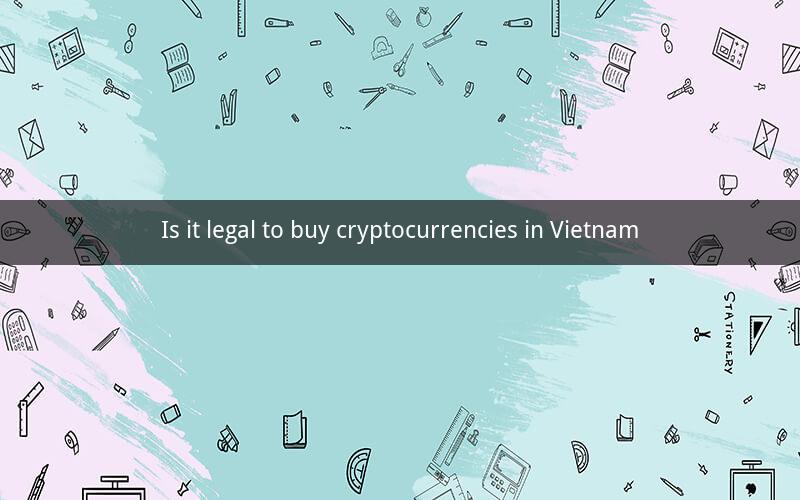
Is it Legal to Buy Cryptocurrencies in Vietnam?
Table of Contents
1. Introduction to Cryptocurrencies in Vietnam
2. The Legal Status of Cryptocurrency in Vietnam
3. The Role of the State Bank of Vietnam
4. The Impact of Cryptocurrency on the Economy
5. The Risks Associated with Cryptocurrency
6. The Future of Cryptocurrency in Vietnam
7. Conclusion
1. Introduction to Cryptocurrencies in Vietnam
Cryptocurrencies have gained significant attention worldwide, and Vietnam is no exception. In recent years, the popularity of cryptocurrencies has surged, and many Vietnamese citizens have shown interest in investing in digital currencies. However, the legality of buying and owning cryptocurrencies in Vietnam remains a topic of concern for many.
2. The Legal Status of Cryptocurrency in Vietnam
The legal status of cryptocurrencies in Vietnam is complex. While the Vietnamese government has not explicitly banned the purchase and ownership of cryptocurrencies, it has not recognized them as legal tender. In 2017, the State Bank of Vietnam (SBV) issued a circular prohibiting financial institutions from providing services related to cryptocurrency transactions. This decision was aimed at protecting the economy from the potential risks associated with cryptocurrencies.
3. The Role of the State Bank of Vietnam
The SBV plays a crucial role in regulating the financial sector in Vietnam, including the cryptocurrency market. The SBV has been actively working to address the risks associated with cryptocurrencies, such as money laundering, fraud, and financial instability. The SBV has also been promoting the development of a legal framework to regulate cryptocurrency transactions and ensure the protection of consumers.
4. The Impact of Cryptocurrency on the Economy
The rise of cryptocurrencies has had both positive and negative impacts on the Vietnamese economy. On the one hand, cryptocurrencies can attract foreign investment and boost the technology sector. On the other hand, the unregulated nature of cryptocurrencies can lead to financial instability and pose risks to the economy.
5. The Risks Associated with Cryptocurrency
Despite the potential benefits of cryptocurrencies, there are several risks associated with them. These risks include:
- Market Volatility: Cryptocurrencies are highly volatile, which can lead to significant losses for investors.
- Security Issues: Cryptocurrencies are stored in digital wallets, which can be vulnerable to hacking and theft.
- Regulatory Uncertainty: The lack of clear regulations can make it difficult for investors to understand the risks associated with cryptocurrencies.
- Lack of Consumer Protection: Without proper regulations, consumers may not have access to the necessary protection in case of fraud or other issues.
6. The Future of Cryptocurrency in Vietnam
The future of cryptocurrency in Vietnam remains uncertain. While the government has not banned cryptocurrencies, it has also not fully embraced them. The SBV is likely to continue its efforts to regulate the cryptocurrency market and protect the economy from potential risks. It is possible that the government may eventually recognize cryptocurrencies as a legitimate asset class, but this will depend on the effectiveness of the regulatory framework.
7. Conclusion
The legality of buying cryptocurrencies in Vietnam is a complex issue. While the government has not banned cryptocurrencies, it has also not fully embraced them. The SBV plays a crucial role in regulating the cryptocurrency market, and the future of cryptocurrencies in Vietnam will depend on the effectiveness of the regulatory framework.
Questions and Answers
1. Q: What is the legal status of cryptocurrencies in Vietnam?
A: Cryptocurrencies are not recognized as legal tender in Vietnam, and the State Bank of Vietnam has issued a circular prohibiting financial institutions from providing services related to cryptocurrency transactions.
2. Q: Can Vietnamese citizens buy cryptocurrencies?
A: Yes, Vietnamese citizens can buy cryptocurrencies, but they must do so through unregulated platforms and exchanges.
3. Q: What risks are associated with buying cryptocurrencies in Vietnam?
A: The risks include market volatility, security issues, regulatory uncertainty, and a lack of consumer protection.
4. Q: How does the State Bank of Vietnam regulate the cryptocurrency market?
A: The SBV has issued a circular prohibiting financial institutions from providing services related to cryptocurrency transactions and is working to develop a legal framework to regulate the market.
5. Q: Can cryptocurrencies attract foreign investment to Vietnam?
A: Yes, cryptocurrencies can attract foreign investment, but the regulatory environment must be favorable to ensure the protection of investors and the stability of the economy.
6. Q: What is the potential impact of cryptocurrencies on the Vietnamese economy?
A: Cryptocurrencies can have both positive and negative impacts on the Vietnamese economy, including attracting foreign investment and posing risks to financial stability.
7. Q: How can Vietnamese citizens protect themselves from the risks associated with cryptocurrencies?
A: Citizens can protect themselves by doing thorough research, using secure wallets, and staying informed about the regulatory environment.
8. Q: What is the future of cryptocurrency in Vietnam?
A: The future of cryptocurrency in Vietnam remains uncertain, but it is likely that the government will continue to regulate the market to protect the economy.
9. Q: Can cryptocurrencies be used for illegal activities in Vietnam?
A: Yes, cryptocurrencies can be used for illegal activities, such as money laundering and fraud.
10. Q: How can the Vietnamese government promote the development of a legal framework for cryptocurrencies?
A: The government can promote the development of a legal framework by consulting with stakeholders, studying international best practices, and implementing regulations that protect consumers and the economy.